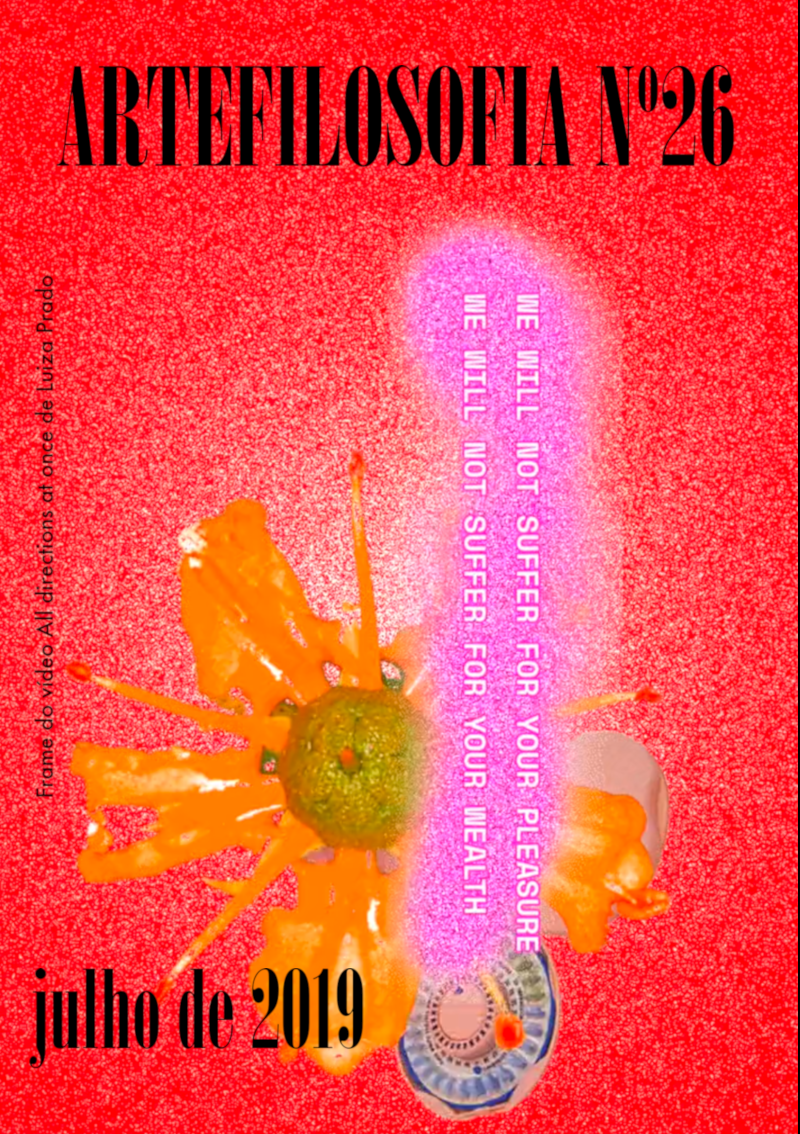Pathways to a materialist theory of art in Walter Benjamin
Abstract
The present work intends to analyse the specificity of the materialistic theory of art according to Walter Benjamin. To do so, we take the essays “Eduard Fuchs, the collector and the historian”, from 1937, and the second version of “The work of art in the age of its technological reproducibility”, written between 1935 and 1936,as points of reference. We also attempt to approach the influence of the art historian Aloïs Riegl in Benjamin’s thought, for, as we see it, this influence plays a decisive role in the elaboration of his theory. Furthermore, we emphasize the primacy of the object and the category of expression as central points in such elaboration. The text culminates in an approach to Benjamin’s concept of “second technique”, which we believe proves the effectiveness of Benjamin’s method in relation to the investigation on cinema.
Downloads
References
BENJAMIN, Walter. A obra de arte na época de sua reprodutibilidade técnica. 2ª versão. Trad.: Francisco de Ambrosis Pinheiro Machado. Porto Alegre: Zouk, 2012.
BENJAMIN, Walter. Écrits autobiographiques. Trad.: Christophe Jouanlannee Jean-François Poirier.Paris: Christian Bourgois Editeur, 1994
BENJAMIN, Walter. "Eduard Fuchs, colecionador e historiador”. O anjo da história. Trad.: João Barrento. Belo Horizonte: Autêntica Editora, 2012.
BENJAMIN, Walter. "Livros que permaneceram vivos”. O capitalismo como religião. São Paulo: Boitempo Editorial, 2013.
BENJAMIN, Walter. Obras escolhidas III: Charles Baudelaire, um lírico no auge do capitalismo. Trad.: José Carlos Martins Barbosa e Hemerson Alves Batista. São Paulo: Brasiliense, 1991.
BENJAMIN, Walter. Origem do drama barroco alemão.Trad.: Sérgio Paulo Rouanet. São Paulo: Brasiliense, 1984.
BENJAMIN, Walter. Passagens. Trad.: Irene Aron e Cleonice Paes Barreto Morão. Belo Horizonte: Editora UFMG; Imprensa Oficial do estado de São Paulo: 2009.
BENJAMIN, Walter. "Rigorous Study of Art: on the first volume of Kunstwissenchaftliche Fouschungen”. In: The Vienna School Reader: Politics and Art Historical Method in the 1930s.Nova York: Zone Books, 2013.
GAGNEBIN, Jeanne-Marie. “Walter Benjamin: estética e experiência histórica”. In:Pensamento alemão no século XX. Vol. 1. Jorge de Almeida e Wolfgang Bader (Org.). São Paulo: Cosac Naify, 2013.
KEMP, Wolfgen. “Walter Benjamin und die Kunstwissenschaft”. In: KritischeBerichte, vol. 1, n.3, 1973, p. 30-52.
KONDER, Leandro.Os marxistas e a Arte: breve estudo histórico-crítico dealgumas tendências da estética marxista.Rio de Janeiro: Editora civilizaçãobrasileira, 1967.
LEVIN, Thomas Y. “Walter Benjamin and the Theory of Art History: an Introduction to ‘Rigorous Study of Art’”. In: The MIT Press, Massachussets, vol. 47, winter, 1988, pp.77-83. Disponível em: http://www.jstor.org/stable/778982 Acesso em: 01/09/2017.
MARX, Karl.O capital: crítica da economia política. Livro I: O processo deprodução do capital. Trad.: Rubens Enderle. São Paulo: Boitempo, 2013.
MATOS, Olgária. “A cena primitiva-Capitalismo e fetiche em Walter Benjamin”. Discretas esperanças. São Paulo: Nova Alexandria, 2006.
RAMPIM, João Lopes. Colecionador, arte e materialismo histórico em WalterBenjamin. São Paulo: Editora Unifesp, 2018.
RIEGL, Aloïs. "El arte industrial tardorromano." Trad.: Ana Pérez López e JulioLinares Pérez.Madri: Visor, 1992.
RIEGL, Aloïs. "Problems of Style: Foundations of a History of Ornament." Trad.: Evelyn Klain. Nova Jersey: Princeton University Press, 1993.
SEMPER, Gottfried.Style in the Technical and Tectonic Arts, or, PracticalAesthetics.Los Angeles: Getty Publications, 2004.
Copyright (c) 2019 Artefilosofia

This work is licensed under a Creative Commons Attribution-NonCommercial-ShareAlike 4.0 International License.
Autores que publicam nesta revista concordam com os seguintes termos:
- Autores/as mantém os direitos autorais e concedem à revista o direito de primeira publicação, com o trabalho simultaneamente licenciado sob a creativecommons.org/licenses/by-nc-sa/4.0/ que permite o compartilhamento do trabalho, com reconhecimento da autoria e publicação inicial nesta revista.
- Autores/as têm autorização para assumir contratos adicionais separadamente, para distribuição não-exclusiva da versão do trabalho publicada nesta revista (ex.: publicar em repositório institucional ou como capítulo de livro), com reconhecimento de autoria e publicação inicial nesta revista.


